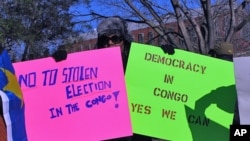Members of the Congolese diaspora are working to bring about change in the Democratic Republic of Congo. They describe economic, political, social, human rights and security conditions in their home country as catastrophic.
Former 2006 presidential candidate George Alula flips through a neatly organized binder he has labeled, "The Congo Recovery Program." The subtitle is "An Economic Response to an Economic War."
Alula has presented his proposal to U.S. administration officials, hoping they will respond more firmly to what is taking place in the U.S.-aided Congo.
Alula said he is dismayed by both the botched elections, which returned Joseph Kabila to power last year, and the violence which continues in the mineral-rich east.
"We have seen a strong position from the Obama administration concerning the Ivory Coast, concerning Libya, concerning Syria. We have the news in Syria every day, but what is going on in the Congo? We provide the material that you use for the communications of the world, the storage capacity coming from coltan [a metallic ore] in the Congo," said Alula. "We deserve your attention. We deserve people’s attention and the world’s attention toward what is going on in Congo."
Poverty, violence are rampant
Kabila first took power after his father, former rebel leader turned president Laurent Desire Kabila, was assassinated in 2001. Since then, the younger Kabila has been declared the winner in two controversial and violence-marred elections.
In recent years, Alula, who now lives in the Washington area, has been taking time off from a business venture in the U.S. automobile industry to meet with U.S. officials, testify in hearings and help organize protests.
Alula said the typical Congolese inside Congo is too crushed by poverty to take part in a sustained people power movement.
"When he wakes up it is about 'what am I going to eat?' So when you are calling them for any protest or any other activity than food, they are not there because they have to find something to eat. So that is why the Congolese diaspora takes over because we do not have that problem," said Alula.
Abraham Lwakabuanga shows a video he helped make recently calling for protests in the Congolese diaspora. The activist for the APARECO opposition party said it is a duty for the 5 million or so Congolese outside the country to play an aggressive role.
He is very disappointed they do not have the right to vote, so he uses other tools, such as a new Internet video channel he has started called Code 243.
Lwakabuanga said he thinks Kabila’s security forces are too harsh for any protest to have any impact, beyond a rising death toll.
Activists like Lwakabuanga describe the ongoing violence in the eastern Congo, where warring factions compete for mineral control, as genocide.
"We lost like 8 million people. Some are saying 6.5 million. When is it going to be called genocide? Nobody wants to talk about what is going on in the Congo. What is a Congolese life worth?" Lwakabuanga asked.
Declaring genocide
Lwakabuanga believes a genocide label would force the international community to really commit itself to end the violence, partly committed by Congolese soldiers and proxy militias. The International Rescue Committee has described Congo's conflict, which started in the late 1990s, as the world's deadliest since World War II, even though the exact number of dead is in dispute. The group estimates the conflict continues to cause the deaths of as many as 45,000 people every month.
Lwakabuanga worries there are too many economic interests, including from U.S. companies, to stop the current situation.
Still, he remains optimistic that like the former Congolese and once U.S.-backed dictator, Mobutu Sese Seko, Kabila also will see his days in power end.
“I am an optimist, that is who I am. Kabila is just a man. Mobutu was there thinking that he was going to remain for 100 years. Somebody was there to oust him with the help of the international community. We need a new leadership in the Congo and we will push until that will happen,” said Lwakabuanga.
Ruling party officials have described exiled opposition leaders as out-of-touch agitators who use their activities as a way to make money.
They also say the country is moving toward more democracy, stability and better governance after years of war and massive corruption, with the help of the United Nations and foreign governments, including the U.S. administration. Kabila himself has been silent recently, with his last address to the nation more than two months ago, as he tries to form a new government.
U.S. officials have recently expressed concern over what they have called the allegations of human rights abuses during last year’s electoral process, which included legislative elections. They have called for those responsible to be held accountable and for security forces to be restrained accordingly.




